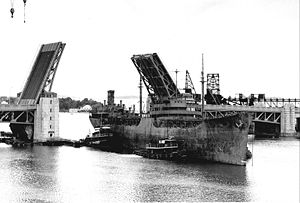USNS Mission San Fernando (T-AO-122)

| |
| Career | |
|---|---|
| Name: | Mission Fernando |
| Builder: | Marinship Corporation, Sausalito, California |
| Laid down: | 26 August 1943 |
| Launched: | 25 November 1943 |
| Commissioned: | 29 February 1944 |
| Decommissioned: | n/a |
| Fate: | Cleared for disposal, 15 November 2006 |
| General characteristics | |
| Class and type: | Mission Buenaventura-class oiler |
| Displacement: |
5,532 long tons (5,621 t) light 21,880 long tons (22,231 t) full |
| Length: | 524 ft (160 m) |
| Beam: | 68 ft (21 m) |
| Draft: | 30 ft (9.1 m) |
| Propulsion: | Turbo-electric, single screw, 6,000 hp (4.47 MW) |
| Speed: | 16.5 knots (30.6 km/h; 19.0 mph) |
| Complement: | 52 |
| Armament: | None |
SS Mission San Fernando was a Type T2-SE-A2 tanker built for the United States Maritime Commission during World War II. After the war she was acquired by the United States Navy as USS Mission San Fernando (AO-122). Later the tanker transferred to the Military Sea Transportation Service as USNS Mission San Fernando (T-AO-122). She was a member of the Mission Buenaventura-class oiler and was named for Mission San Fernando Rey de España in Los Angeles, California. She was later renamed USNS Muscle Shoals (T-AGM-19) (after Muscle Shoals, Alabama, and, later, USNS Vanguard (T-AGM-19/T-AGM-194).
Contents
Service history
As oiler, 1943–1957
Mission San Fernando was laid down on 26 August 1943 under a Maritime Commission contract by Marine Ship Corporation, Sausalito, California; launched on 25 November 1943; sponsored by Mrs. Ruth B. Krohn; and delivered on 29 February 1944. Chartered to Pacific Tankers Inc., for operations, she served the remainder of the War carrying fuel to Allied forces in the western Pacific (during which time she was twice awarded the Battle Efficiency Award as well as the National Defense Service Medal). She remained in service until 10 May 1946 when she was returned to the Maritime Commission and laid up in the Reserve Fleet at Olympia, Washington.
Acquired by the Navy on 21 October 1947 she was chartered to the Union Oil Company for operations and placed in service under the operational control of the Naval Transportation Service as Mission San Fernando (AO-122). Transferred to the operational control of the newly created Military Sea Transportation Service on 1 October 1949 she was redesignated USNS Mission San Fernando (T-AO-l22). She served in MSTS until 24 May 1955 when she was returned to the Maritime Administration and laid up in the Maritime Reserve Fleet at Olympia. She was struck from the Naval Vessel Register on 22 June 1955.
Reacquired by the Navy on 21 June 1956 she was placed in service with MSTS and operated, under charter, by Marine Transportation Lines. She served with MSTS until she was returned to the Maritime Administration on 4 September 1957 and laid up in the Maritime Reserve Fleet at James River, Virginia.
As tracking ship, 1964–1999
Reacquired by the Navy on 28 September 1964 she was taken in hand by General Dynamics Quincy Shipbuilding Division for extensive modernization and rebuilding at its Quincy, Massachusetts yard. This included adding 80 feet to her length. While under conversion to a missile-range instrumentation ship, she was renamed for Muscle Shoals, Alabama and reclassified, becoming Muscle Shoals (AGM-19). Renamed Vanguard on 1 September 1965, she was placed in service with MSTS on 28 February 1966 as USNS Vanguard (T-AGM-19). Designed to be a seagoing missile tracking station, she participated in the Apollo Project test series and into 1969 had continued in these duties. She then participated in the Skylab program.
In September 1980, she was reclassified as T-AG-194. She was reconfigured and the large missile tracking antennas were removed. Her role became that of a Navigational Test Ship and she was used to check submarine navigation systems. She was stricken again on 12 December 1999.
Disposal
On 29 November 2001 she was transferred to the United States Maritime Administration (MARAD). On 16 March 2005 MARAD issued a "Request for Comments" for public input on the historical significance of the Vanguard.
As of 29 February 2008 she is anchored in the James River (2nd from right) as part of the National Defense Reserve Fleet or James River Reserve Fleet, a "Ghost fleet". Following historical review, the vessel was cleared for disposal by the Virginia State Historic Preservation Office on 11/15/2006.
References
This article includes text from the public domain Dictionary of American Naval Fighting Ships.
- "Mission San Fernando". Dictionary of American Naval Fighting Ships. http://www.navsource.org/archives/09/5319h.htm. Retrieved April 2, 2006.
- "AO-122 / T-AO-122 Mission San Fernando / AGM-19 Muscle Shoals / T-AGM-19 / T-AG-194 Vanguard". Fleet Oiler (AO) Photo Index. http://www.navsource.org/archives/09/53/5319.htm. Retrieved April 2, 2006.
- "National Defense Reserve Fleet Inventory" (PDF). 2006. http://www.marad.dot.gov/Offices/Ship/Current_Inventory.pdf. Retrieved June 11, 2006.
- Vanguard's Naval Vessel Registry entry
External links
- Ships for which MARAD is soliciting comments from the public re: their historic significance as of 3/16/05.
- Muscle Shoals AGM-19.jpg
Muscle Shoals (AGM-19) nearing completion, in dry dock at Quincy.
| |||||
- Pages with broken file links
- Wikipedia articles incorporating text from the Dictionary of American Naval Fighting Ships
- Type T2-SE-A2 tankers
- Ships built in Sausalito, California
- 1943 ships
- World War II tankers of the United States
- Mission Buenaventura class tankers
- Type T2-SE-A2 tankers of the United States Navy
- United States Navy California-related ships
- Cold War auxiliary ships of the United States
- Apollo program
